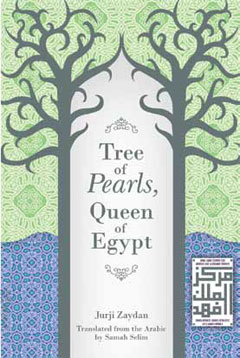By Wided Khadraoui
Tree of Pearls, Queen of Egypt
By Jurji Zaydan
Syracuse University Press, 2012
The “Tree of Pearls, Queen of Egypt” by Jurji Zaydan was originally published in 1914 and was recently translated and released in English by Samah Selim, an assistant professor at Rutgers University. The novel follows the “Tree of Pearls,” Fatma al-Malikah al-Din Um-Khalil, and her favorite slave, Shwaykar, during a period of great upheaval.
The inevitable downfall of the Ayyubids and the powerful emergence of the Mamluks form the core of the narrative. The Ayyubids were a Muslim dynasty of Kurdish origin whose rule centered in Egypt, and they ruled much of the Middle East during the 12th and 13th centuries CE. “Tree of Pearls” elevation to the throne started the Turkic origin Mamluk era into power. The Mamluk dynasty remained the most powerful political force until the Ottoman period, repelling the advances of the Mongols, and expelling the Crusaders from the Holy Land.
Zaydan’s novel traces the very short reign of Egypt’s first Muslim queen, and as is common in historical novels, it is full of sexual politics, lovers’ betrayals, and treacheries. The Tree of Pearls’ Malmuk lover Izza al-Din Aybak first helps her garner the throne, but then betrays her for the Sallafa, a powerful concubine, who then betrays him for Shwaykar’s fiancé Rukn al-Din Baybars. The novel’s twisted plot holds the reader’s interest.
Zaydan’s novel, “Tree of Pearls, Queen of Egypt,” was originally published as a serial, much like the works of Alexander Dumas or Charles Dickens, and its chapters reflect the self-contained nature of their narrative style. The chapters can be read independently and largely consist of anecdotes from either 13th century Cairo or Baghdad. These autonomous chapters serve both to educate and entertain. Although at times the translation renders the English an antiquated feel, Selim’s recent translations of Zaydan are indicative of a larger resurgence in interest of Arab history. One of Zaydan’s primary goals was to share the Arab world’s collective history through an entertaining medium, such as the historical novel. His desire to perpetuate the region’s historical legacy lives on in this time of regional reawakening.
This article appeared in Al Jadid Magazine, Vol. 17, No. 65, 2011.
Copyright © 2012 AL JADID MAGAZINE

